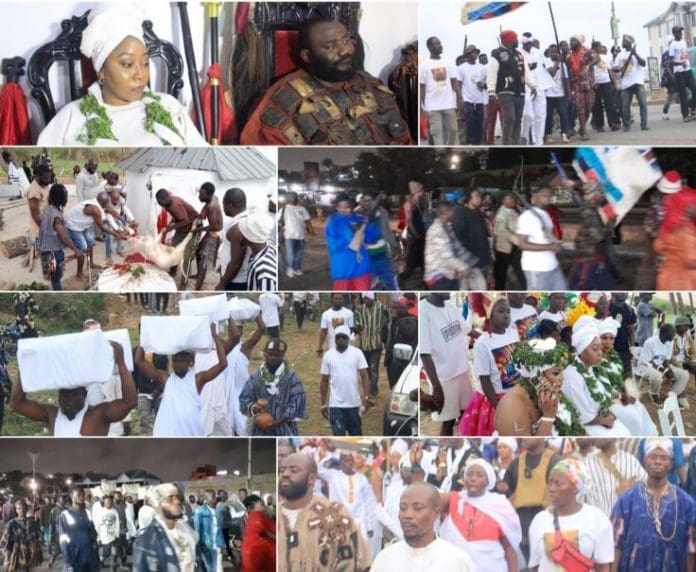The Ngleshie Lafaa Barima community, led by Nii Ayi Okufobour I, Lafa Berima Nmarko Mantse Ngleshie Alata, celebrated this year’s annual Homowo festival with a night-long procession and ancestral rites. The ceremony, which took place from 11 PM on Thursday, September 11, 2025, to 8 AM the following morning, was a powerful display of tradition and spirituality.
The procession, which included chiefs, elders, priests, priestesses, and community members, began at the Mallam market and went to the Lafaa Bush. Dressed in white attire, the group marched amidst the chanting of traditional songs, with Nii Ayi Okufobour I leading the way. The chief performed the sacred rite of dropping mashed yams (oto) and boiled eggs on the ground, a symbolic act of feeding and remembering the ancestors and departed leaders.
At the Lafaa Bush, the priests; chiefs and elders engaged in solemn prayers and ancestral remembrance. In a show of gratitude for the year’s successes and protection, they offered a variety of livestock, including a cow, sheep, goat, and fowls, as sacrifices to the gods and stools. These sacrifices were a gesture of appreciation and a plea for continued guidance and protection in the coming year.
The procession continued to the main palace, the Nii Ayi Okufobour I Ngleshie Alata Lafaa Nmarko Onyaitso Stool House at Weija Junction, where the ceremonies concluded. The event underscored the community’s commitment to preserving its cultural heritage and honouring its past.
In an interview following the completion of the ancient customs, Nii Ayi Okufobour I, the Ngleshie Alata Lafaa Nmarko Mantse, emphasised the critical importance of continuing the traditions performed by their forefathers. He explained that a key purpose of the rituals is to cleanse any lingering evil spirits from accident scenes and roads within the Lafaa community, including the busy Weija-Kasoa highway.
The traditional leader detailed the significance of dropping mashed yams, known as oto, at major intersections. “We believe that whenever our ancestors, whom we believe still live around us in the spiritual realms, go to work in the farms and at sea, they feed on the dropped food whenever they get to these junctions,” he stated. He further emphasised that the rituals purify the path for the sacred stools, noting, “We believe that some souls still remain on the street even after their mortal remains have been evacuated. Therefore, before the sacred stools of Ngleshie Lafaa Alata are moved, we perform these customs to take off these souls and perceived dirt of the departed.”
He also expressed the belief that these rituals can help reduce the rampant vehicular accidents by appeasing the victims’ souls, appealing to them to refrain from causing further harm to passing vehicles.
On the subject of tribalism, the Mantse admonished his fellow traditional leaders and GaDangme parents to actively encourage their children to learn the GaDangme language at home and in school. He also advocated for learning other local languages like Twi, so that Akans and people from other tribal backgrounds can, in turn, learn GaDangme.
By Kingsley Asiedu
Source: newsghana.com.gh











